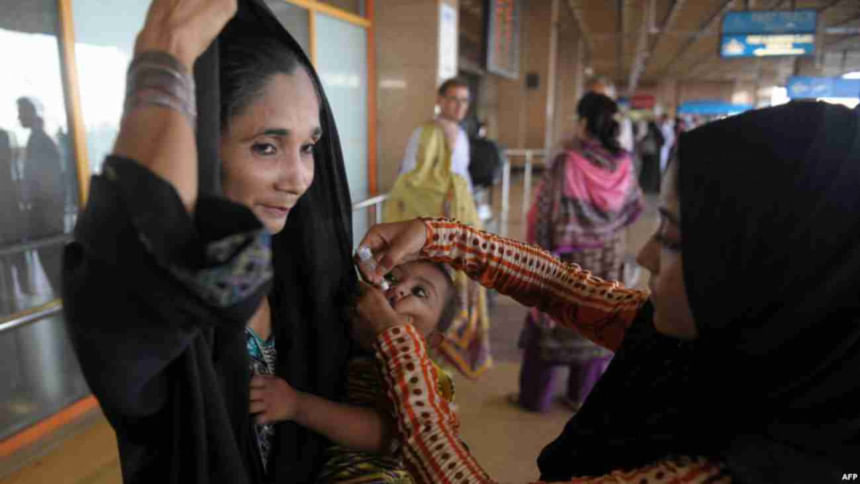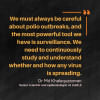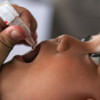Helping the heroines of polio eradication

In June this year, world governments and other donors pledged USD 1.2 billion to help carry the 30-year fight to eradicate polio over the finish line. At its height, the polio epidemic caused 350,000 cases of paralysis in children every year. Last year, only 37 cases were reported. So far this year, the number stands at six.
But as momentous as these gains are, victory over polio is not yet assured. And one factor—the role of female vaccinators—will be a critical determinant of success.
Women have long been on the front lines of the global effort to end polio. In places like the tribal areas of Pakistan, male vaccinators are often not allowed to enter a stranger's home, whereas female health workers can deliver the vaccine to vulnerable children, along with other routine immunisations and basic health services.
In 2015, I travelled to neighbouring India to take part in a national immunisation campaign, joining an all-female team of health workers assigned to administer the polio vaccine to children in an impoverished part of New Delhi. I accompanied a local health worker, Deepika, on my crutches, as I have been crippled by polio myself.
We made our way through the crowded dirt paths, and at one house, a mother of three whom Deepika knew well invited us in. Deepika paused knowingly: "Someone is missing," she said, counting two children. The mother replied that her eldest child had gone to another village. Deepika recorded this fact in her notepad, vowing to return, and vaccinated the remaining children before moving on. Even one child missed is too many.
In countries where polio still persists—Pakistan, Afghanistan, and Nigeria—vaccinators like Deepika work tirelessly to reach every child. This "last mile" in the global polio eradication drive is indeed the toughest. According to the June 2017 report of the Independent Monitoring Board (IMB) of the Global Polio Eradication Initiative, more than a million children remain unvaccinated, including 858,000 in Pakistan alone.
The hardest-to-reach children in Pakistan are those on the move, travelling from relative to relative as families search for a better life, often crossing the Afghan border. While some of these children are vaccinated at border crossings, many are missed.
The IMB is now calling for a new approach: finding the children not when they are in transit, but wherever they reside, no matter how short their stay. This strategy calls for deep local knowledge to anticipate when a child will return, so that a vaccinator can be there. And who better to know such intimate details than the women of the communities in need of this service?
In the Pakistani district of Kohat, south of Peshawar, female vaccinators have been credited with helping to lower the number of unvaccinated children from 30,000 to 22,000, and to reduce the number of vaccine refusals from around 4,000 to 400. These brave and dedicated women conduct their work despite great obstacles, including threats to their safety. One health worker described how she has been going door to door to administer the polio vaccine to children for 16 years. Despite pleas from her family to stop, she persists, heartened by the fact that for years, not a single child in her area had been crippled by polio.
Conversely, in Quetta, the area of Pakistan with the highest number of susceptible children, female vaccinators are in short supply, and turnover is high. There, the number of confirmed polio cases is on the rise.
These two cities tell the story of the polio eradication campaign: success, or failure, depends on the role that female vaccinators play. To ensure that female vaccinators stay engaged in this fight, it is essential to address the obstacles—whether physical security, social constraints, or low pay—that they confront.
Let us not forget the risks these women take to protect everyone from a disease that has taken an enormous toll on global health. As a polio survivor, I simply cannot fathom the possibility that, with complete eradication in our sights, we might allow polio to return.
Since UNICEF began emphasising the hiring of women for its polio programme in 2014, the number of female vaccinators has increased dramatically. Nearly 62 percent of vaccinators in Nigeria are women. In Pakistan, the proportion of female vaccinators is 58 percent, and 30 percent in Afghanistan. As Aidan O'Leary, UNICEF's chief of anti-polio efforts in Pakistan, has noted, "female vaccinators are driving every single operational gain that is being made."
To be sure, female vaccinators are not the only ones immersed in this global fight. Religious and local leaders have played pivotal roles in building public understanding and engagement. Police and military personnel are sometimes needed to protect vaccinators from security threats. And, of course, political commitments at the highest levels have kept the momentum going.
But at the end of the day, women on the ground know their communities best, and are uniquely qualified to finish the job. Completing the last mile will require creativity and tenacity, and governments and donors should support the women who will get the world across the finish line, to a world with zero polio cases.
Minda Dentler, a 2017 Aspen New Voices fellow, is a polio survivor and a global health advocate. In 2013, she became the first female wheelchair athlete to complete the Ironman World Championship in Kona, Hawaii.
Copyright: Project Syndicate, 2017.
www.project-syndicate.org
(Exclusive to The Daily Star)







Comments